The production of the 1993 10-cent coin is part of the Roosevelt dime series, first issued in 1946. Since then, the Roosevelt dime became popular among Americans, one of the most widely used coins today.
If you wish to learn more about the 1993 dime, you must continue reading.
What Is the 1993 Roosevelt Dime Made Of?
The 1993 Roosevelt dime is made of 75% copper and 25% nickel. This is the same composition used from 1965 to the present year. The Roosevelt dime was first struck with a composition of 90% silver and 10% copper from 1946 until 1964.
The story behind choosing Franklin Roosevelt for the 10-cent coin is interesting. As you may remember, Roosevelt suffered from polio. He spearheaded the March of Dimes movement, where people can donate dimes or 10 cents to help people with disabilities. Since the March of Dimes and the 10-cent coin are somewhat related, Congress chose the dime to feature the image of Roosevelt.
Regarding design, the 1993 Roosevelt dime has the left profile of Roosevelt. Inscriptions include Liberty, In God We Trust, 2017, the designer’s initials, and the mint mark, which indicates where the coin was struck.
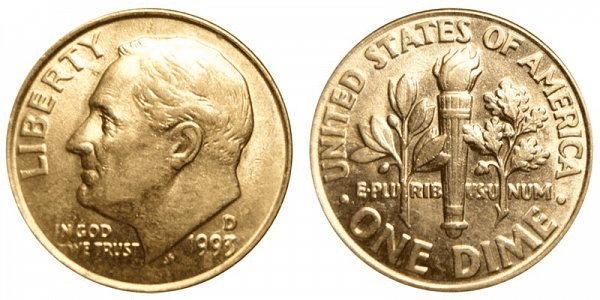
On the reverse, you’ll find three images (from left to right): olive branch, Liberty torch, and oak branch. The inscription includes UNITED STATES OF AMERICA, ONE DIME, E PLURIBUS UNUM.
The symbolisms behind each engraved element on the dime are also interesting. Of course, the US Mint chose Roosevelt to honor him as the president who led the United States through the Great Depression and World War II.
Liberty is an important principle and value for many Americans. “In God We Trust” shows the religious Judeo-Christian roots of the country.
“E pluribus unum” means out of many, one. This US motto constantly reminds everyone that the country flourishes when everyone is united.
The sprig of olive signifies peace, while the sprig of oak signifies strength. The Liberty torch represents enlightenment.
1993 Roosevelt Dime Varieties
The 1993 Roosevelt dime comes in four different varieties. These are the following:
| Variety | Mint Location | Mintage |
| 1993 D Mercury Dime | Denver | 750,110,166 |
| 1993 P Mercury Dime | Philadelphia | 766,180,000 |
| 1993 S Proof Mercury Dime | San Francisco | 2,633,439 |
| 1993 S Proof Silver Mercury Dime | San Francisco | 761,353 |
| Total | 1,519,684,958 |
With that in mind, let’s take a look at each of the varieties in greater detail.
1993 D Roosevelt Dime
Year of minting: 1993
Mint Mark: D
Place of minting: Denver
Quantity produced: 750,110,166
Face Value: $0.10 (10 cents)
Price: $0.15 to $0.35 (circulated condition)
Mass: 2.27 grams
Edge: Reeded
Designer: John R. Sinnock
Composition: 75% copper and 25% nickel
Diameter: 17.90 millimeters
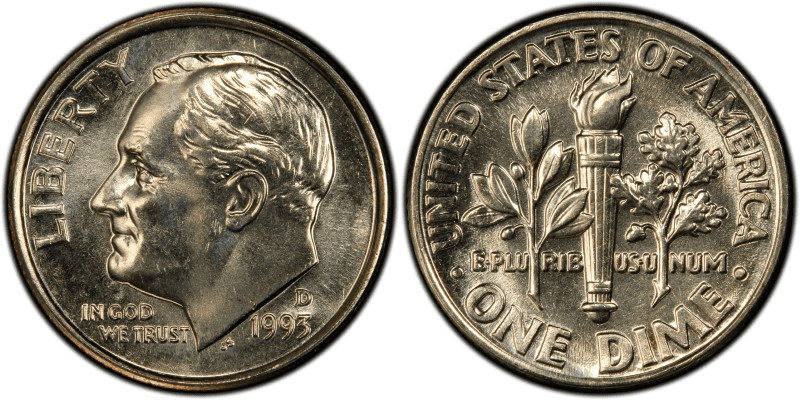
There were more than 750 million 1993 D dimes produced in 1993. The coin isn’t that valuable today since many of them are in circulation. You can buy a 1993 D dime for $0.15 to $0.35.
1993 P Roosevelt Dime
Year of minting: 1993
Mint Mark: P
Place of minting: Philadelphia
Quantity produced: 766,180,000
Face Value: $0.10 (10 cents)
Price: $0.15 to $0.35 (circulated condition)
Mass: 2.27 grams
Edge: Reeded
Designer: John R. Sinnock
Composition: 75% copper and 25% nickel
Diameter: 17.90 millimeters
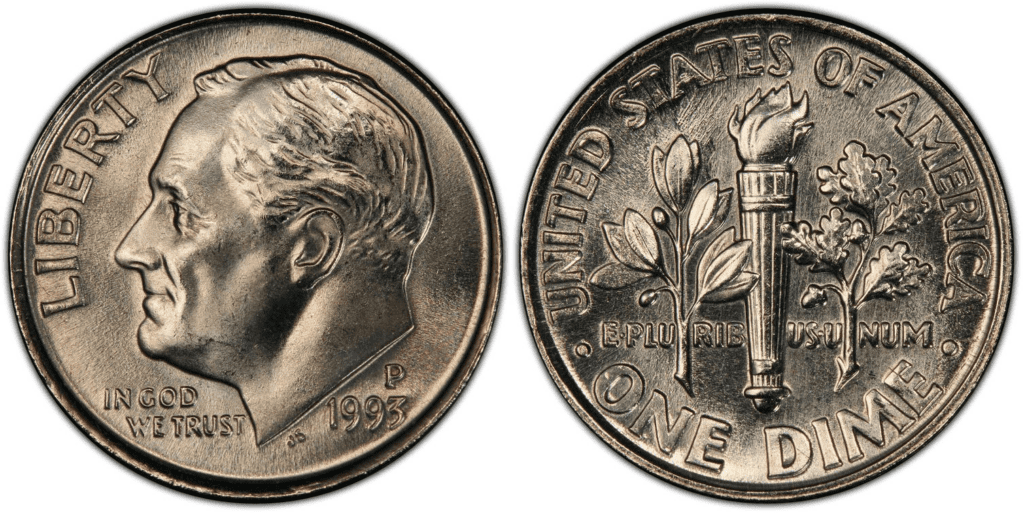
The Philadelphia Mint produced the most number of 1993 dimes. With more than 766 million dimes, it is unsurprising that the 1993 P variety isn’t that valuable. The same as the 1993 D, the 1993 P is just less than 1 dollar if it is in circulated condition.
1993 S Proof Roosevelt Dime
Year of minting: 1993
Mint Mark: S
Place of minting: San Francisco
Quantity produced: 2,633,439
Face Value: $0.10 (10 cents)
Price: $5.70 or more (uncirculated condition)
Mass: 2.27 grams
Edge: Reeded
Designer: John R. Sinnock
Composition: 75% copper and 25% nickel
Diameter: 17.90 millimeters
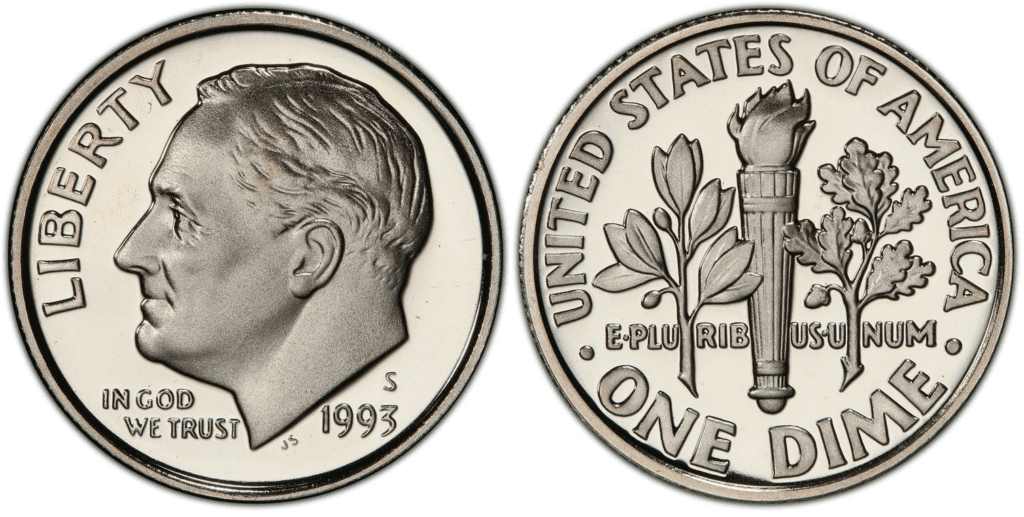
In 1993, there had always been a great demand for proof coins. This is evidenced by the huge mintage figure of proof coins the San Francisco Mint produced. The mint produced more than 2.6 million proof coins.
Generally speaking, proof coins are more expensive than standard-struck coins. That’s why you can buy a 1993 S-proof dime coin for around $5.70.
1993 S Silver Proof Roosevelt Dime
Year of minting: 1993
Mint Mark: S
Place of minting: San Francisco
Quantity produced: 1,317,579
Face Value: $0.10 (10 cents)
Price: $8.42 or more (uncirculated condition)
Mass: 2.27 grams
Edge: Reeded
Designer: John R. Sinnock
Composition: 75% copper and 25% nickel
Diameter: 17.90 millimeters
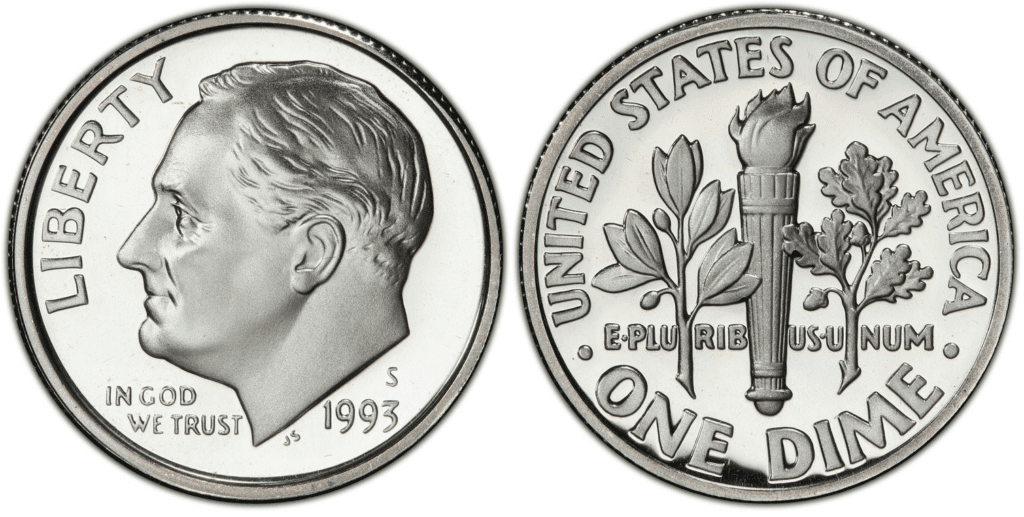
The San Francisco Mint produced two varieties of dimes in 1993. One is the proof version, while the other is the silver-proof version.
The 1993 S silver dimes are made of 90% silver and 10% copper. It has a higher value since it is made of precious metal. Pricing could start around $8.
The silver dime version is fewer than the normal proof coins, with around 1.3 million examples.
List Of 1993 Roosevelt Dime Errors
The US Mint produced more than a billion of 1993 Roosevelt dimes. So, there’s always a chance that an error coin would happen.
Here are some examples of 1993 Roosevelt dime errors:
Off-center strike
The die hitting the planchet at the wrong angle created an off-center strike error. This happens due to the improper alignment of the die and planchet.
Here’s an example of a 1993 dime with an off-center strike error:
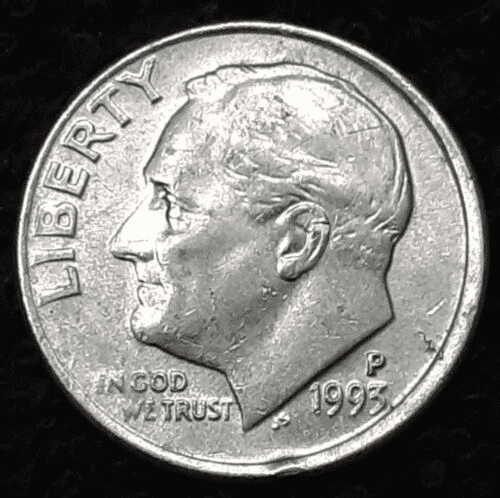
Strike-through error
The strike-through error happens when a foreign material gets in between the planchet and die. The die strikes through the foreign material, and this can prevent the die from completely hitting the planchet, or the strike can be weakened.
Here’s an example of a strike-through error:
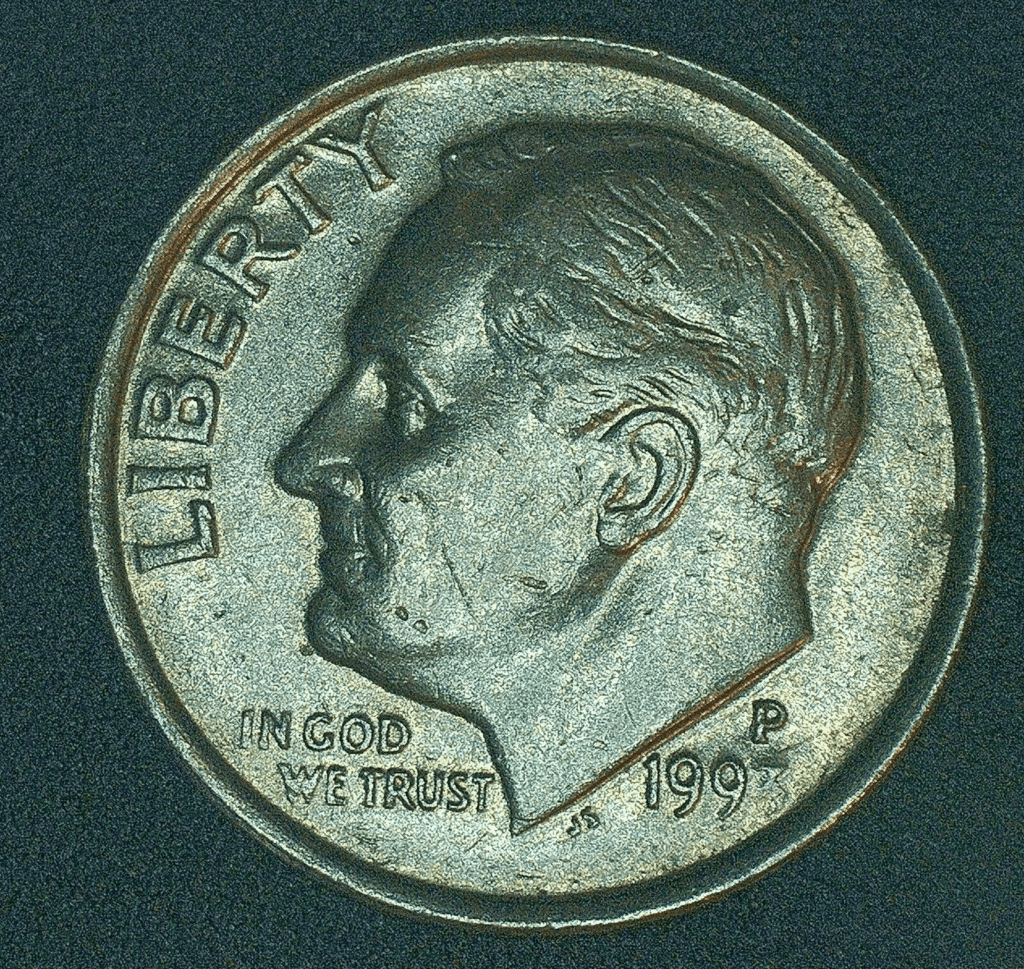
Notice the weak strike on the number 3 in the year “1993.” The foreign material, in this case, is more likely to be grease. The grease weakened the die’s strike on the number 3, which made the 3 appear faded.
Double rim error
The double rim error is a manifestation of an off-center strike. Because the strike moved in a different direction, the edge of the coin forms two rims just like this one:
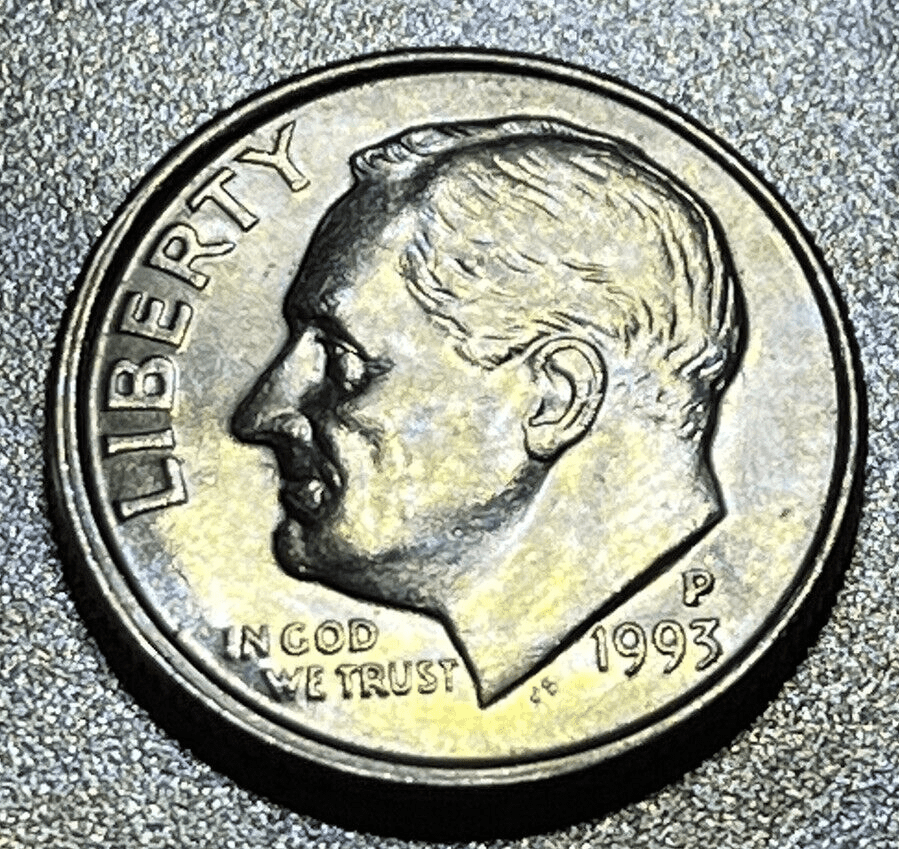
Improper annealed error
The process of adding luster to the coin is called annealing. When the process isn’t done right, there will be discoloration to the coin, just like this one:
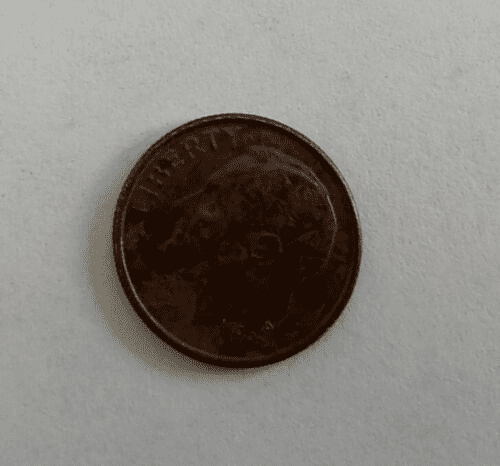
Repunched mint mark
The repunched mint mark happens when the mint mark is struck to the coin twice. The error isn’t obvious in most cases because the second strike was hit exactly at the same angle. However, if there’s a slight change in the angle of strike, you’ll see a doubling in the mint mark.
Here’s an example:
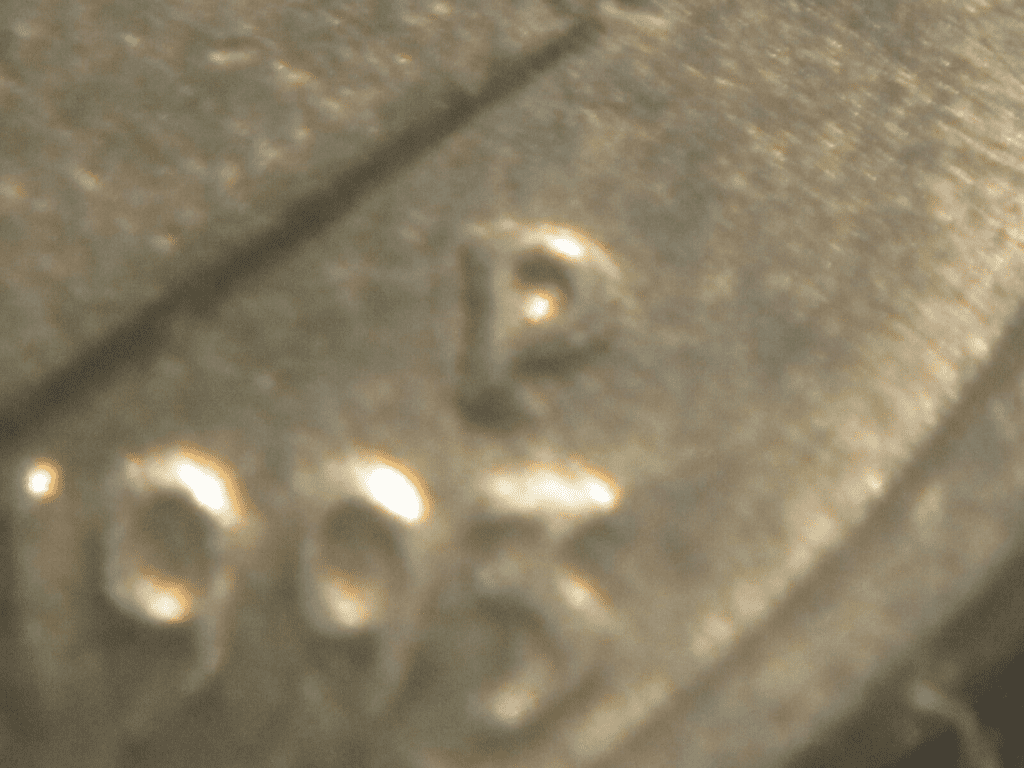
How Much Is 1993 Roosevelt Dime Worth Today?
The 1993 Roosevelt has a melt value of $0.0244. On the other hand, the melt value of the 1993 S silver proof coin is $1.6298. The face value is 10 cents. According to NGC, the usual value of the 1993 Roosevelt dime is between $0.15 and $0.35. Proof coins can be more valuable at around $5-$10.
The melt value and face value aren’t that much. So, you might not be interested in collecting these coins. Nevertheless, did you know that 1993 Roosevelt dimes are worth more than their face value?
Check out this table of auction records for each of the varieties of the 1993 Roosevelt dime:
| Coin | Condition | Grade | Sold date | Sold by | Value |
| 1993 P Roosevelt Dime | Uncirculated – Full Band | MS 62 | September 22, 2010 | Heritage Auctions | $2,990 |
| 1993 D Roosevelt Dime | Gem Uncirculated – Full Band
|
MS 66 | September 10, 2018 | eBay | $700 |
| 1993 S Proof Roosevelt Dime | Perfect Uncirculated – Deep Cameo | PR 70 | May 1, 2003 | Heritage Auctions | $633 |
| 1993 S Silver Proof Roosevelt Dime | Perfect Uncirculated – Deep Cameo | PR 70 | May 1, 2003 | Heritage Auctions | $414 |
As you can see, the 1993 dime can still be valuable. Aside from that, unique and rare error coins can also fetch hundreds of dollars.
How Does The Grading System Work?
The 1993 Roosevelt dime is graded based on preservation, strike, luster, color, and attractiveness. By looking into these factors, an appraiser will give the 1993 dime a grade between 1 to 70.
Professional numismatists joined in the 1970s and established CoinGrading standards, known as the Sheldon Scale. These numismatists now assign grades at key places on the seventy-point scale, using the most regularly utilized numeric points in conjunction with the original adjective grade. The following are the most common coin grades:
- (P-1) Poor – Indistinguishable and probably damaged; if used, must have a date and mintmark; otherwise, rather battered.
- (FR-2) Fair – Nearly smooth, but without the damage that a coin graded Poor often possesses. The coin must have enough detail to be identified.
- (G-4) Fair – Inscriptions have merged into the rims in some areas, and important elements have been mostly erased.
- (VG-8) Very Good- A little weathered, but all primary design elements are visible, albeit faintly. There is little, if any, central detail left.
- (F-12) Good – The item is very worn, yet the wear is even, and the overall design details stand out clearly. Rims are almost completely isolated from the field.
- (VF-20) Very Fine – Moderately weathered, with some finer features still visible. The motto or all letters of LIBERTY are readable. Both sides of the coin have entire rims separated from the field.
- (EF-40) Extremely Fine – Gently used; all gadgets are visible, and the most important ones are bold. The finer details are bold and clear; however, light wear may be seen.
- (AU-50) Uncirculated – Slight evidence of wear on the coin’s design’s high points; it may have contact marks; eye appeal should be adequate.
- (AU-58) Uncirculated Choice – Slight traces of wear, no severe contact marks, almost full mint shine, and great eye appeal.
- (MS-60) Mint State Basal – Strictly uncirculated; no indication of wear on the coin’s highest points, but an unsightly coin with reduced luster, visible contact marks, hairlines, and other flaws.
- (MS-63) Mint State Acceptable – Uncirculated, but with contact scratches and nicks, little reduced shine, but otherwise appealing appearance. The strike is weak to average.
- (MS-65) Mint State Choice – Uncirculated with great mint shine, little contact blemishes, and exceptional eye appeal. The strike is unusually severe.
- (MS-68) Mint State Premium Quality – Uncirculated with superb luster, no obvious contact marks to the naked eye, and exceptional eye appeal. The strike is quick and appealing.
- (MS-69) Almost Perfect Mint State – Uncirculated with perfect brilliance, a sharp and appealing strike, and extremely good eye appeal. A near-perfect coin with minor imperfections in the planchet, strike, and contact markings (seen only under 8x magnification).
- (MS-70) Mint State Perfect – Under 8x magnification, no tiny imperfections are discernible; the strike is crisp, and the coin is perfectly centered on a beautiful planchet. Rarely seen on a coin, this coin is bright and whole, with original luster and exceptional eye appeal.
Where To Buy Or Sell 1993 Roosevelt Dime?
The 1993 Roosevelt Dime is available online and offline. This means that you can go to the Internet, type in “1993 Roosevelt dime,” and you should find your needed coins.
If the Internet isn’t your tea, you can visit antique stores, pawnshops, and coin shops. Aside from these places, auction houses are known to offer the rarest and most valuable coins.
FAQs
How much does a 1993 dime weigh?
The 1993 dime weighs 2.50 grams.
Is there anything special about a 1993 dime?
The 1993 dime becomes special when graded MS67 or PR67 and above. 1993 dime coins can also be special if it has unique and interesting errors.
How much is a 1993 gold dime worth?
The 1993 dime is not made of gold. If you find a 1993 dime made of gold, that would be extremely rare and could be dramatically valuable.
